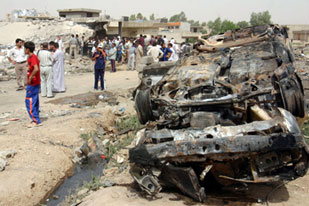
It was not long ago that the "surge" in Iraq was cause for praise and a measure of success during the U.S. presidential race. Some in the U.S. Congress have even argued that the "surge" is a recipe that could be exported to Afghanistan to defeat the Taliban. The fact of the matter is that the surge did work, but only for a short while.
It is now apparent that the Iraqi insurgency has adapted to what the U.S. and Iraqi forces have been throwing at it. When the surge was in full swing in and around Baghdad, the Iraqi insurgency retreated, but since June 30, when U.S. troops in Iraq withdrew from urban centers, some insurgents moved right back in, while others shifted their attention to the Iraqi north. A cat and mouse game.

In the past, the insurgents focused on the Shia and almost succeeded in whipping up an all out sectarian war between Sunnis and Shias in 2006 when they blew up the golden dome of the al-Askari Mosque in the Iraqi city of Samarra, one of the holiest sites in Shia Islam. Although no injuries occurred in the blast, the mosque was severely damaged, and the bombing resulted in violence over the following days. Currently the insurgents have been switching their attention to the Kurds in the north, trying to exploit disputes between them and Arabs.
Bombings and shootings are reported almost daily in and around Mosul, the capital of the northern province of Nineveh. More than 150 people have been killed in violent incidents in Iraq during the past five days, according to a tally by the Associated Press. Just recently, two suicide bombers killed at least 21 people in a cafe in northern Iraq. The double bombing occurred at about 5 p.m. in the Ayoub coffee house in Sinjar, a town about 240 miles northwest of Baghdad. Most of the victims were Yazidis, a Kurdish-speaking religious minority.
What's interesting in this new round of attacks is the fact that no one has been claiming responsibility for them. So who is responsible for them? The answer to this question depends on who is answering it.
The Iraqi-state controlled media and U.S. financed television station Al Iraqiya have been recently laying the blame on insurgency groups like al-Qaeda in Mesopotamia, as the Iraqi wing of the jihadist movement calls itself. However, if you watch the Arabic speaking Iranian television station Al Alam, the blame rests with Saudi Arabia. The station has been conducting interviews with Iraqi analysts and some senior Iraqi government advisors, who have been accusing the Kingdom of sending legions of extremists across the border in an attempt to destabilize the oil-rich Iraqi north in order to drive oil prices back up.
Meanwhile, just like the U.S. generals and politicians, Iraqi Prime Minister Nuri al-Maliki has being counting on the "surge" and success in security for his campaign to get re-elected in January. His government has been bombarding the airwaves with ads about "a secure Iraq" and "support the Iraqi Forces", but with this never ending cycle of violence, weary Iraqis seem to be losing hope. An Iraqi resident on TV summed it all up, "talk is cheap...and our blood is even cheaper," he said.
